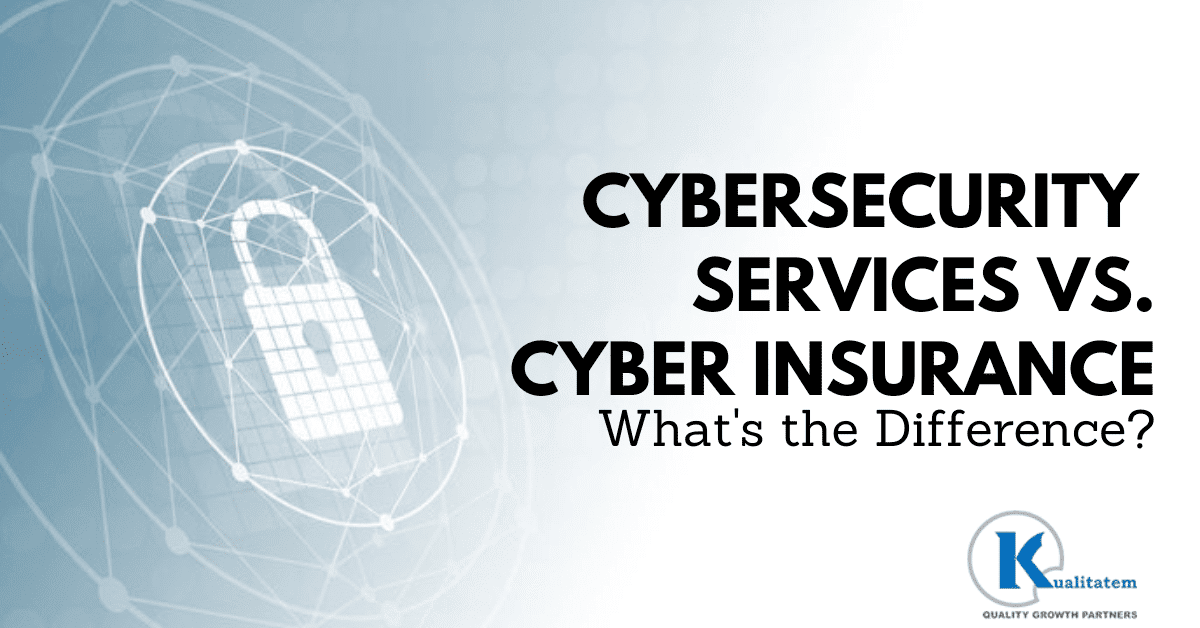Cybersecurity Services vs. Cyber Insurance: What’s the Difference?

- March 20, 2023
- admin
As our world becomes more reliant on technology, cybersecurity has become a critical issue for businesses and individuals alike. Cyberattacks can be costly, causing significant financial losses and reputational damage. As a result, businesses have started to take proactive measures to protect themselves against cyber threats. Two of the most common approaches to managing cybersecurity risks are through cybersecurity services and cyber insurance.
In this blog post, we’ll explore the differences between these two approaches and discuss their relative strengths and weaknesses.
Cybersecurity Services
Cybersecurity services are a set of practices and technologies designed to protect computer systems, networks, and other digital assets from cyber threats. These services are provided by experts who can help identify vulnerabilities in a company’s IT security and develop a cybersecurity strategy to address them. Some of the most common cybersecurity services include:
Vulnerability assessments
A vulnerability assessment is an evaluation of a company’s digital assets to identify vulnerabilities that could be exploited by cyber attackers.
Penetration testing
Penetration testing is a controlled cyberattack that tests a company’s security defenses and identifies weaknesses that need to be addressed.
Security audits
A security audit is an evaluation of a company’s security posture against industry best practices and standards.
Incident response
An incident response is a set of procedures to follow in the event of a data breach or other cybersecurity incident.
Cybersecurity services help organizations in the following ways:
- Identify and manage risks
- Develop and implement cybersecurity plans
- Respond to incidents quickly and efficiently
While cybersecurity services can be expensive, they are an effective way to protect against cyber threats and mitigate the potential impact of a cyber attack.
Cyber Insurance
Cyber insurance, on the other hand, is a type of insurance that provides financial protection in the event of a cyber attack. Its policies cover the costs associated with a data breach, including:
- Legal fees
- Forensic investigations
- Public relations
- Other expenses
Cyber insurance can also provide coverage for lost income due to a data breach and even ransom payments.
Cyber insurance policies vary depending on the provider and the specific policy. Some policies may only cover certain types of cyberattacks, such as phishing attacks or ransomware attacks. Others may cover a wider range of cyber threats, such as social engineering attacks, denial of service attacks, and data theft. Cyber insurance policies may also have specific requirements that companies must meet to qualify for coverage, such as implementing specific IT security measures or regularly conducting vulnerability assessments.
While cyber insurance can provide financial protection in the case of a data breach, it does not prevent cyber attacks from occurring. Instead, cyber insurance is one component of a comprehensive cybersecurity strategy. Cyber insurance policies can help mitigate the financial impact of a data breach, but they do not address the underlying IT security issues that allowed the breach to occur.
Which Approach Is Right for You?
Deciding whether to invest in cybersecurity services or cyber insurance depends on your business’s specific needs and risk appetite. If your company has a significant amount of sensitive data or relies heavily on digital systems, it may be worth investing in cybersecurity services to identify and manage risks. Cybersecurity services can help develop a comprehensive cybersecurity plan that addresses your specific needs and risks.
On the other hand, if your company is willing to accept some level of risk and wants financial protection in case of a cyber attack, cyber insurance may be a more appropriate option. Cyber insurance policies can provide peace of mind and financial protection in the event of a data breach or other cybersecurity incident.
Ultimately, a comprehensive cybersecurity strategy should include both cybersecurity services and cyber insurance. Cybersecurity services can help prevent cyber attacks from occurring, while cyber insurance can provide financial protection in the event of a data breach.
Conclusion
In summary, cybersecurity services and cyber insurance are two approaches to managing cybersecurity risks. Security services are a set of practices and technologies designed to protect computer systems, networks, and other digital assets from cyber threats. Cyber insurance, on the other hand, is a type of insurance that provides financial protection in the event of a cyber attack. While both approaches are important, they serve different purposes. Cybersecurity services help prevent cyber attacks from occurring and mitigate the potential impact of a cyber attack, while cyber insurance provides financial protection in the event of a data breach or other cybersecurity incident.
It’s important to note that cybersecurity risks are constantly evolving, and both cybersecurity services and cyber insurance should be regularly reviewed and updated to ensure they remain effective. Businesses should work with cybersecurity experts to develop and implement a comprehensive cybersecurity strategy that addresses their specific needs and risks.
In conclusion, whether you choose to invest in cybersecurity services, cyber insurance, or both, the most important thing is to take cybersecurity seriously. Cyberattacks can have a significant impact on businesses of all sizes, and it’s essential to take proactive measures to protect against them. By investing in cybersecurity services and cyber insurance, businesses can help manage their cybersecurity risks and minimize the potential impact of a data breach or other cybersecurity incident.











